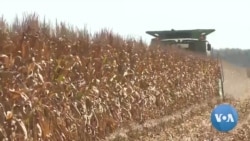After a tumultuous four years marked by trade uncertainty and now a global pandemic, many farmers across the country still supported President Donald Trump at the ballot box. Despite ongoing and unsupported claims of voter fraud, they are coming to terms with his loss in the November election.
“It appears that the president’s chances grow dimmer day by day,” said farmer and Illinois Farm Bureau Vice President Brian Duncan.
“I certainly think you can see instances of fraud and manipulation, but I find it hard to see that there would be that on the scale you would need to turn it around,” Fred Grieder explained to VOA on his farm outside Bloomington, Illinois. “Yeah, I think it’s done.”
Both Grieder and Duncan raise crops in the Midwest state of Illinois, where President-elect Joe Biden won a decisive election victory fueled by support in densely populated areas, like the city of Chicago.
But rural Illinois, where President Trump was popular, is important to the nation’s agriculture industry.
Only about 1% of the U.S. population lives on a farm, but the agriculture and food industry represent about 5% of U.S. gross domestic product. Illinois is one of the country’s leading producers of corn and soybeans, the primary crops on both Grieder and Duncan’s farms, which is why they are interested in who Biden picks to lead the United States Department of Agriculture (USDA).
“I’d rather see someone who is more 'production-ag' oriented to fill that role who can understand the needs of rural America and the farmers because, really, USDA is the one advocate we have in an administration,” said Duncan, who views the current USDA secretary, former Georgia Gov. Sonny Purdue, as someone who had President Trump’s ear.
“Certainly not everything he said or did was supported wholeheartedly in the countryside, but by and large the farmers I talked to saw Secretary Purdue as an advocate and an ally.”
“That’s the person who has to go to the president and make sure they advocate for whatever agriculture’s needs are, so that’s going to be a key one,” agreed Mark Gebhards, governmental affairs director for the Illinois Farm Bureau.
'There’s a lot of unknowns'
Gebhards, who works with government agencies on behalf of Illinois farmers to guide public policy on trade, environmental regulation and government aid packages, also emphasized the vital importance of Cabinet picks for the U.S. Trade Representative and Environmental Protection Agency.
“I think farmers felt that President Trump had their backs by providing the Market Facilitation payments that were there to alleviate some of the economic hit because of the trade war that was going on,” he said, using a technical term to describe agricultural government aid packages.
Under Trump and Purdue, tens of billions of dollars in government aid flowed to farmers to offset losses in profit resulting from the administration’s escalating trade disputes, mostly with China. Despite recent progress, including the so-called China Phase One Agreement, Beijing hasn’t reached pre-trade war levels of purchases on products such as soybeans.
“There’s a lot of unknowns especially when it comes to China, and … China is the big player in the game when it comes to purchases that they make,” Gebhards said.
“They are still purchasing more from the competitors of the United States than they are from the U.S.” said University of Chicago political science professor Robert Gulotty in a recent Skype interview.
He says China has turned to Brazil and Argentina for grain needs amid the trade dispute.
“We haven’t been increasing exports to China despite the fact that China has been importing more from every other country in the world," Gulotty said. "So that suggests that the U.S. is losing its market share relative to these other countries, and it’s a sign that the U.S. is losing something."
Whether that loss can be attributed to the economic disruption of COVID-19 or Chinese tariffs on U.S. grains, he added, is difficult to determine. Gulotty also says potential benefits of the Trump administration’s aggressive trade tactics may not be realized until well after Trump has left office, something farmers like Brian Duncan describe as “short-term pain for long-term gain.”
“Biden is in a better position when it comes to trade policy in some sense, in a negotiation sense, because of the actions the Trump administration has taken,” Gulotty said. “At the same time, though, it’s been quite disruptive.”
As Biden continues to assemble his Cabinet, Duncan is taking a wait-and-see approach while preparing for farm life under a new presidential administration.
“I hope this administration, like any administration, would look out for rural America, would look for more trade deals, biofuel usage, economic stability, a farm bill that provides an economic backstop," Duncan said. "All those things I’m hopeful we’ll get. It’s just too soon to know, but I’m hopeful for the best.”






